
Fiction set in the future, generally addressing a dystopian reality that has obsessed art and letters for decades, has always been one of the genres most applauded by readers. Proof of this are these best futuristic books that have led more than one to wonder if the Earth, as we know it today, is on the best path.
The Time Machine, by HG Wells
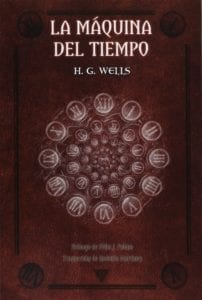
Many years before Orson Welles sows panic in America by broadcasting a radio recording that warned of the arrival of aliens from the novel by HG Wells War of the Worlds, one of the most visionary writers of his generation launched The time Machine, flagship work of science fiction literature. Published in 1895, the work served to coin the term «time Machine»With which the protagonist, a 802.701th century scientist, traveled to the year XNUMX to discover the presence of beings called Eloi without culture or intelligence. A classic.
Brave New World, by Aldous Huxley

Oh what a wonder!
How many beautiful creatures are here!
How beautiful is humanity! Oh happy world
where people like that live.
These words mentioned by the character of Miranda in the play The Tempest, by William Shakespeare, would be the perfect inspiration for Huxley when writing A happy world, his greatest work and one of the best futuristic books ever. Published in 1932, the story takes us to a consumer society supported by the hypnopedia, or the ability to learn through dreams applied to humans cultivated in the image and likeness of an assembly line. A "happy" world achieved thanks to the suppression of culture, globalization or the concept of "family" in the world as we know it today. Quite a (terrible) revelation.
I, robot, by Isaac Asimov
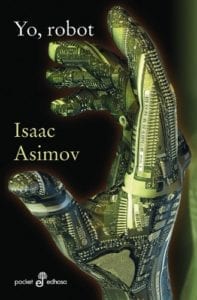
- First law of robotics: A robot cannot harm a human being or, by inaction, allow a human being to be harmed.
- Second law: A robot must obey the orders given by human beings, except when these conflict with the first law.
- Third law: A robot must protect its own integrity, as long as this does not prevent compliance with the first and second laws.
These three laws served as the basis for the Foundation Trilogy, a set of books and stories with which Asimov became visionary at a time, the 30s, when science was beginning to take off. Of all the stories included, Yo robot is possibly the most famous of them all, representing in a more narrative way the conflict unleashed by a robotics conceived as a great ally of society in the future not too far away.
1984, by George Orwell
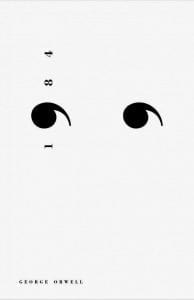
La Second World War it fueled the belief in many thinkers that human beings could become their own enemy and use totalitarianism to ruin human freedom. Hence, in 1949, the launch of Orwell's book was embraced by readers who found in its pages a revelation that had been announced for a long time. Set in the London of a dystopian year 1984, the novel presents the famous resource of the Gran Hermano, the main ally of the Thought Police when it comes to controlling a society where thinking or expressing oneself in a way different from that established is totally prohibited. Years after 1984, society has not yet succumbed to such a dystopian panorama, but the control exercised by new technologies or existing dictatorships confirm that, perhaps, we are not that far away.
Would you like to read 1984by George Orwell?
Fahrenheit 451, by Ray Bradbury
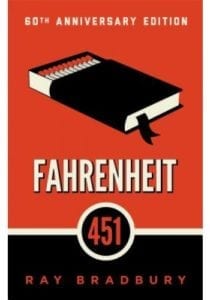
Considered together with the previous 1984 and Brave New World as the "trinity" of dystopian novels of our time, Fahrenheit 451 it becomes a direct reference to literature, an art that in the future poses a danger to humanity, since it makes them think too much and begin to ask questions. Hence the protagonist, a firefighter named Guy Montag, is entrusted with the paradoxical task of burning books. The name of the novel, which refers to the temperature on the Fahrenheit scale at which books begin to burn (the equivalent of 232,8ºC), draws directly from the influence of one of Bradbury's great inspirations, Edgar Allan Poe, to tell us a story as sinister as it is powerful adapted to the cinema in 1966 by visionary François Truffaut.
The Road, by Cormac McCarthy
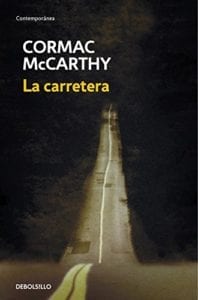
The XNUMXst century has become a good time for the dystopian and futuristic novel, turning the genre into the best cultural engine when it comes to reflecting. A good example is The road, One best American novels of the last twenty years as well demonstrated by its sales success or the Pulitzer and James Tait Black Memorial Awards McCarthy received a few months after the publication of the book in 2006. Set in a future Earth destroyed by a catastrophe not specified in the book, the play follows in the footsteps of a father and his son through a world of dust, loneliness and, before everything, hunger, the main cause that leads the protagonists to face the new cannibals of a dying planet.
The Hunger Games, by Suzanne Collins
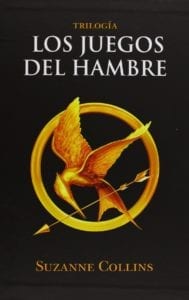
In the future state of Panem, the Capitol dominates 12 poverty-stricken districts. This is why the perfidious leader Snow each year recruits a boy from each state to compete in a televised contest called The Hunger Games, where the mission consists of eliminating all the opponents until being the winner. A tradition that is challenged after the arrival of Kat niss ever deen, protagonist of the three installments published in 2008, 2009 and 2010, leading to the famous film saga starring Jennifer Lawrence. One of the most successful dystopian novels for young people of recent times and a source of inspiration for many other similar works such as Divergent or The Maze Runner, published in later years.
What are, for you, the best futuristic books in history?